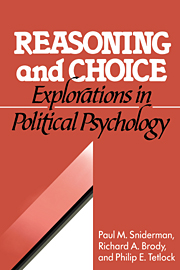Book contents
- Frontmatter
- Contents
- List of tables and figures
- Preface
- 1 Introduction: major themes
- 2 The role of heuristics in political reasoning: a theory sketch
- 3 Values under pressure: AIDS and civil liberties
- 4 The principle–policy puzzle: the paradox of American racial attitudes
- 5 Reasoning chains
- 6 The likability heuristic
- 7 Democratic values and mass publics
- 8 Ideological reasoning
- 9 Information and electoral choice
- 10 Stability and change in party identification: presidential to off-years
- 11 The American dilemma: the role of law as a persuasive symbol
- 12 Ideology and issue persuasibility: dynamics of racial policy attitudes
- 13 The new racism and the American ethos
- 14 Retrospect and prospect
- Notes
- Bibliography
- Subject index
- Author index
14 - Retrospect and prospect
Published online by Cambridge University Press: 05 May 2010
- Frontmatter
- Contents
- List of tables and figures
- Preface
- 1 Introduction: major themes
- 2 The role of heuristics in political reasoning: a theory sketch
- 3 Values under pressure: AIDS and civil liberties
- 4 The principle–policy puzzle: the paradox of American racial attitudes
- 5 Reasoning chains
- 6 The likability heuristic
- 7 Democratic values and mass publics
- 8 Ideological reasoning
- 9 Information and electoral choice
- 10 Stability and change in party identification: presidential to off-years
- 11 The American dilemma: the role of law as a persuasive symbol
- 12 Ideology and issue persuasibility: dynamics of racial policy attitudes
- 13 The new racism and the American ethos
- 14 Retrospect and prospect
- Notes
- Bibliography
- Subject index
- Author index
Summary
Some stocktaking is in order. Two different questions need consideration. The first is how far we have traveled; the second, where we must set out for next.
Our concern, frankly, is with the second question. Having put all our cards on the table in the last thirteen chapters, we shall offer a fairly speedy answer to the first. Still more important, precisely because we believe we have made limited but genuine progress, it cannot suffice to continue asking the same questions: It is necessary to at least sketch the new questions that have emerged from our research.
We have assembled these studies to contribute to a more satisfactory explanation of how people figure out what they favor and oppose politically. The criteria of a more satisfactory explanation are various, so we want to comment on the account of reasoning and choice we have developed.
THE FIRST STANDARD OF PROGRESS
There are two quite different ways of determining if a research program is making headway: One is if old questions are being disposed of, the other if new questions are cropping up. Let us comment on each, in order.
So long as minimalism held sway, a theory of political reasoning was unnecessary. Why develop an account of how people work out their position on a political issue if the fundamental point to appreciate is that they are unlikely to have one?
- Type
- Chapter
- Information
- Reasoning and ChoiceExplorations in Political Psychology, pp. 261 - 272Publisher: Cambridge University PressPrint publication year: 1991
- 1
- Cited by



